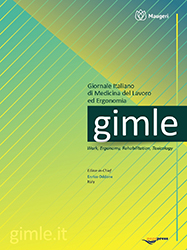[The management of individual cases and the role of the competent practitioner]
La gestione dei casi singoli e il ruolo del medico competente
All claims expressed in this article are solely those of the authors and do not necessarily represent those of their affiliated organizations, or those of the publisher, the editors and the reviewers. Any product that may be evaluated in this article or claim that may be made by its manufacturer is not guaranteed or endorsed by the publisher.
Authors
Although a growing portion of european working population is facing with psycho-social risks, only about 30% of public and private institution identify individual cases and are implementing actions aimed to their prevention and management. In addition to the formal evaluation of work-related stress, it is crucial to identify individual cases in order to support people to face them efficiently. The ambulatory of Occupational Medicine jointly instituted by the University of Rome Tor Vergata and by the Policlinico Tor Vergata di Roma (having an agreement with the National Health System) offers to patients a multi-disciplinary approach including psychiatric and psychological evaluation in addition to the evaluation of the occupational setting. Since 2010, 264 patient have been visited, with a growing percentage in recent years of cases related to inter-personal conflicts as well as other forms of organizational constraints and some recent situations which could be linked to strain (which is a peculiar organizational consequence which may cause personal damage owing to the creation of psychological subalternity). Therefore, the psychological pathway given by the ambulatory seems increasingly useful in order to preserve the occupational relationship, at least in the cases in which it is not definitively compromised. The occupational physician has a primary role in identifying cases in which an in-depth evaluation is needed, in encouraging the sharing of negative experiences and in correctly evaluating the clinical picture.
How to Cite

This work is licensed under a Creative Commons Attribution-NonCommercial 4.0 International License.
PAGEPress has chosen to apply the Creative Commons Attribution NonCommercial 4.0 International License (CC BY-NC 4.0) to all manuscripts to be published.






